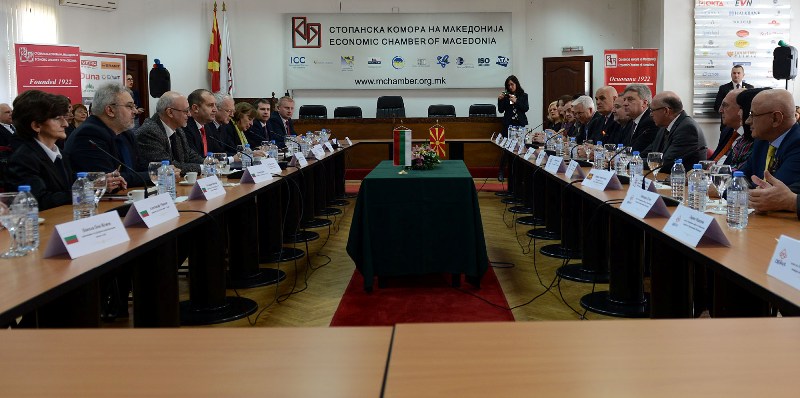|
 The Presidents of the Republic of Macedonia and of the Republic of Bulgaria, Dr. Gjorge Ivanov and Mr. Rumen Radev, at today's meeting in Skopje, agreed to initiate the signing of a strategic cooperation agreement between the two countries. The Presidents of the Republic of Macedonia and of the Republic of Bulgaria, Dr. Gjorge Ivanov and Mr. Rumen Radev, at today's meeting in Skopje, agreed to initiate the signing of a strategic cooperation agreement between the two countries.
At the joint press conference after the meeting, President Ivanov said that after signing the Treaty of Friendship, Good Neighborliness and Cooperation, which will greatly contribute to the development of the overall bilateral cooperation, it would be good for Skopje and Sofia to sign a strategic partnership agreement, as Macedonia has with the United States and Turkey.
"The migrant crisis showed that cooperation and exchange of information in the field of defense, security and intelligence is needed. That is why we will initiate the signing of a strategic partnership agreement. We also discussed the new EU enlargement strategy, which is largely a merit of Bulgaria. Realistic are the possibilities during the Bulgarian presidency, Macedonia to start EU membership negotiations and it is realistic to expect a NATO membership invitation at the Summit this summer. I welcome the initiative of Bulgaria and the demonstrated commitment as our first neighbor to directly support the European and Euro-Atlantic integrations and thank through President Radev for everything Bulgaria has done so far for Macedonia's progress in these EU integration processes, President Ivanov said.
The Bulgarian President Radev assessed as very important the initiative of signing a strategic partnership agreement, adding that he would speak of it with the Government in Sofia and since such an agreement would increase security of all stakeholders in the region.
"The Treaty of good neighborly relations with a country that is a member of the European Union and NATO is the strongest proof that there are no provisions for irredentism and territorial pretensions in the Macedonian Constitution, President Ivanov said, and reminded that Bulgaria was the first country to recognize the Republic of Macedonia under its constitutional name.
President Radev said that the Treaty of Good Neighborliness should not only remain on paper, but be an unstoppable process that will be constantly promoted.
"Bulgaria has always been one of the strongest supporters of Macedonia for the EU and NATO. But there is still much to be done in various spheres, and Bulgaria is ready to help Macedonia", Radev said.
Regarding the ongoing negotiations between Macedonia and Greece for resolving the name dispute, the Bulgarian president said Sofia supports a solution to the name dispute between Skopje and Athens that will not include territorial parts of Bulgaria and will not affect third parties.
The Bulgarian position is clear, the name dispute with Greece should not contain a geographical determinant that includes territorial parts of the Republic of Bulgaria, President Radev said, responding to a journalist question and stressed that Bulgaria does not plan to impose any sanctions on Macedonia in regard to its European and Euro-Atlantic integrations regarding the name negotiations, and added that this issue is to be solved between the two sovereign states, under the United Nations auspices.
President Radev added that these negotiations also concern Bulgaria, but noted that he believes that a solution acceptable for both Macedonia and Greece will be found, which will not affect third parties.
President Ivanov said that the negotiations on the problem that Greece has with the constitutional name of the Republic of Macedonia will continue in the UN, and that the Macedonian side will strive to find a solution that will not be detrimental to third parties and will not involve them in the process.
|